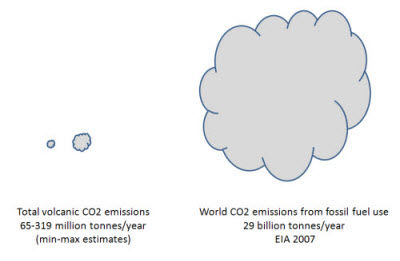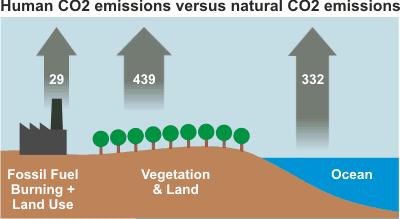Krakatoa actually cooled the planet because of the aerosols and dust put into the atmosphere. Hmm....did you read Heaven and Earth: Global Warming ? the Missing Science by Ian Plimer?
Try this instead: http://www.skepticalscience.com/volcanoes-and-global-warming.htm
The burning of fossil fuels and changes in land use results in the emission into the atmosphere of approximately 30 billion tonnes of carbon dioxide per year worldwide, according to the EIA. The fossil fuels emissions numbers are about 100 times bigger than even the maximum estimated volcanic CO2 fluxes.
This is also interesting: http://www.earthmagazine.org/article/voices-volcanic-versus-anthropogenic-carbon-dioxide-missing-science?page=1
Published estimates based on research findings of the past 30 years for present-day global emission rates of carbon dioxide from subaerial and submarine volcanoes range from about 150 million to 270 million metric tons of carbon dioxide per year, with an average of about 200 million metric tons,
These global volcanic estimates are utterly dwarfed by carbon dioxide emissions from fossil fuel burning, cement production, gas flaring and land use changes; these emissions accounted for some 36,300 million metric tons of carbon dioxide in 2008, according to an international study published in the December 2009 issue of Nature Geoscience. Even if you take the highest estimate of volcanic carbon dioxide emissions, at 270 million metric tons per year, human-emitted carbon dioxide levels are more than 130 times higher than volcanic emissions.
Interesting LibGS, thanks for the info. Is carbon dioxide the biggest "greenhouse gas" then? Way I see it, is we should probably stop chopping down trees so they can turn it back into oxygen then.
And interestingly enough, with all this extra CO2 in the atmosphere how come my gas test readings still show O2 levels at 19.8%? One would assume O2 readings would start declining as CO2 levels rise? That is one question that I really would like to know the answer to.
To be honest, I am more concerned with the many many tonnes of highly radioactive water flowing into the Pacific ocean every day from the Fukushima meltdown mutantifying our sea life



